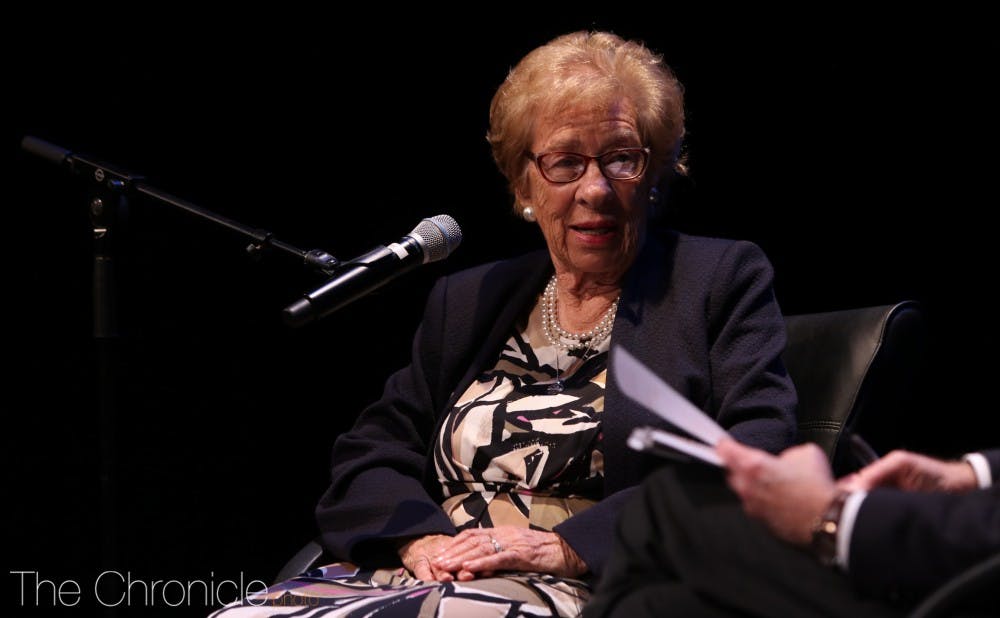Eva Schloss, a Holocaust survivor and posthumous stepsister of Anne Frank, recalled at a sold-out event Monday how the Nazis stole her humanity and how she struggled to regain it in the years that followed.
Almost 90 years old, Schloss recounted her childhood before, during and after the Holocaust to a crowd of over 1000 people in Page Auditorium. As the childhood friend and stepsister of Anne Frank, Schloss spoke about the horrors of the Holocaust from two perspectives in a discussion moderated by Dr. Ralph Snyderman, former dean of the School of Medicine.
“We were very lucky, we had a good home, a good family [before the Holocaust, but] without warning, life changed not just for our family, but for all the Jewish people,” Schloss said. “Hitler realized that no one wants Jews, so if I’m going to kill them, no one is going to lift a finger.”
Schloss recounted her childhood in Vienna fondly, but noted that “Austria changed over night” with the arrival of the Nazis, describing the change as “culture shock.” Her family decided to move to Holland to escape the antisemitism that was spreading throughout Austria.
“Holland was considered a safe country in the beginning, but it wasn’t of course,” she said.
The move was difficult for Schloss because she didn’t speak Dutch. She became withdrawn and struggled to make friends until she met an 11-year-old Anne Frank in a dress shop. The girls became fast friends and would play together after school.
Despite this brief reprieve, antisemitism and persecution soon followed Schloss’s family to Amsterdam. At first, the restrictions on Jews were just a “nuisance,” but the discriminatory measures slowly became more dangerous, she explained.
“Before the Nazis invaded, we were free, we could do everything,” Schloss said. “The Dutch said, ‘We are going to protect you,’ but they didn’t count on the viciousness of the Nazis.”
Schloss recalled that her family went into hiding around the same time as the Frank family. She explained how she and her mother hid separately from her father and brother in order to increase the chances of their survival, which was the first time she realized that “it was a matter of life and death.”
After nearly two years in hiding, Schloss’s family was arrested by the Gestappo on the evening of her 15th birthday, she said. They were betrayed by a Dutch nurse who was a double agent for the Nazis.
Schloss noted how they were treated “like cattle” as they were transported to Auschwitz-Birkenau where she and her mother were separated from her father and brother again.
Upon arriving at the camp, they were first stripped of their clothing, hair and names, she recalled. Afterwards, a Nazi doctor would decide who would live and who would die.
“All humanity was taken away from us…Right or left, life or death,” she said.
Schloss described the conditions in the camp as “filthy” and “infected,” adding that she witnessed the “degradation of human beings” while there. Anne Frank wound up dying at the concentration camp.
“They didn’t harm each other, but…people were only for themselves,” Schloss said. “[It took] all of our strength and will to keep alive.”
The camp was eventually liberated by the Soviets in January of 1945. Schloss noted that even though she was happy, this was “not yet the end of [her] suffering” since many more people died later, including her father and brother.
Schloss traveled with the Soviet soldiers eastward until the end of the war. She described listening to an opera for the first time after the war as the moment when she “started to feel slowly a bit like [a] human being” again.
Although Schloss had lost her father, brother and friend, she and her mother were reunited with Anne’s father Otto Frank after the war ended. Her mother and Otto married several years later.
When asked by an audience member if she still believes in God, Schloss remarked that she left the concentration camp as an atheist, adding that she had lost her faith in humanity.
“I was a proud Jew. I would never give up my Judaism, but in the camp, I started to doubt the existence of God,” she said.
Another audience member asked if she will ever forgive the people who executed the Holocaust.
“I have forgiven the German people as a whole, but the individual Nazi leaders…those were really evil people. [For them], I have no forgiveness,” she said.
Get The Chronicle straight to your inbox
Signup for our weekly newsletter. Cancel at any time.

